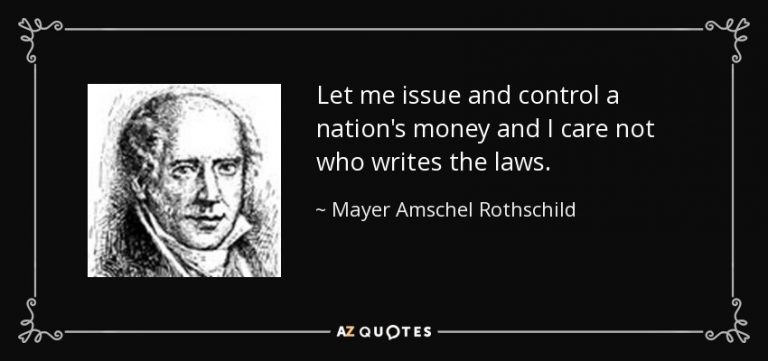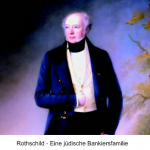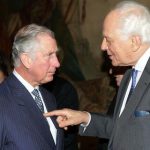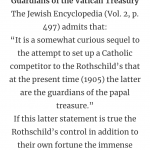In this world, wealth is power. To find out who has the power, we have to look at who has the most wealth. The common person has no idea how the worlds financial system is really set up. For example, the Federal Reserve is controlled by who? The U.S. Government? No, it is actually a private bank which is essentially a private corporation that the federal government has no control of. The creators of the Federal Reserve only created the illusion that is what owned by the federal government by its deceptive name.
The Federal Reserve was created by 300 people and banks. It is owned by these 12 banks:
Rothschild Bank of London
Warburg Bank of Hamburg
Rothschild Bank of Berlin
Lehman Brothers of New York
Lazard Brothers of Paris
Kuhn Loeb Bank of New York
Israel Moses Seif Banks of Italy
Goldman, Sachs of New York
Warburg Bank of Amsterdam
Chase Manhattan Bank of New York
Throughout the establishment of the United States, international bankers have fought against the government to prevent them from printing their own currency, debt and interest-free. To finance the civil war and not plunge the nation into further debt by paying large sums of interest to international bankers, Abraham Lincoln printed his own currency called Greenbacks. This was soon revoked following Lincoln’s death and the U.S. was back to paying interest on its currency.
In 1913, President Woodrow Wilson passed the Federal Reserve Act which gave the Federal Reserve power to print and control money through the Treasury at no interest to the FED. The FED is a criminal organization and created possibly the biggest fraud of all time. The FED works by creating currency out of thin air, backed by nothing, loans this out through banks, and then charges interest. This is like someone having $10,000 to their name and loaning out $50,000,000 with a 5% interest rate. Logically, this makes no sense. How can you loan money you don’t have? Not only is money being loaned out that really doesn’t exist, but massive amounts of interest are being charged on the loans. This is what causes inflation. If a car is worth $10,000 but the average person is paying $12,000 in total on the car due to interest, how much is the car really worth? An item that should have been worth $10,000 is costing $12,000. This causes money to be devalued. For currency to be devalued, money has to be taken out from somewhere. The interest that is paid out to the banks goes straight up the pyramid into the hands of the wealthiest people on earth, the international banking cartels. In short, inflation is a result of theft by the international bankers.
The United States is owned and controlled by the international bankers. The international banking cartels now control almost every nation on earth by creating a death grip of death on every nation through the establishment of a central banking system. The Federal Reserve purposely created a system of debt that they knew the United States would never be able to pay off and would only get worse and worse. Not only do the banks steal from hardworking Americans through interest on personal loans, but they also use interest to steal from taxpayers. In 2019, the federal government will collect $3.6 trillion from taxpayers. 11% of the money collected from taxpayers will go to paying the interest on the national debt. $393 Billion of taxpayer money will be paid out to the Federal Reserve for interest.
The Rothschild banking dynasty is who really owns the Federal Reserve. This is the richest and most powerful family in the world. Forget those list of billionaires like Jeff Bezos and Mark Zuckerberg. The wealth of the “worlds richest” pale in comparison to the Rothschilds who literally print entire nations money and manipulate international markets. The Rothschild family alone has hundreds of trillions of dollars in wealth.

Below Is a list of Central banks suspected of being owned or controlled by the Rothschild Banking empire.
Afghanistan: Bank of Afghanistan Albania: Bank of Albania Algeria: Bank of Algeria Argentina: Central Bank of Argentina Armenia: Central Bank of Armenia Aruba: Central Bank of Aruba Australia: Reserve Bank of Australia
Austria: Austrian National Bank Azerbaijan: Central Bank of Azerbaijan Republic
Bahamas: Central Bank of The Bahamas Bahrain: Central Bank of Bahrain Bangladesh: Bangladesh Bank Barbados: Central Bank of Barbados Belarus: National Bank of the Republic of Belarus Belgium: National Bank of Belgium Belize: Central Bank of Belize Benin: Central Bank of West African States
Bermuda: Bermuda Monetary Authority Bhutan: Royal Monetary Authority of Bhutan Bolivia: Central Bank of Bolivia Bosnia: Central Bank of Bosnia and Herzegovina Botswana: Bank of Botswana Brazil: Central Bank of Brazil Bulgaria: Bulgarian National Bank Burkina Faso: Central Bank of West African States (BCEAO) Burundi: Bank of the Republic of Burundi
Cambodia: National Bank of Cambodia Cameroon: Bank of Central African States
Canada: Bank of Canada – Banque du Canada Cayman Islands: Cayman Islands Monetary Authority
Central African Republic: Bank of Central African States Chad: Bank of Central African States
Chile: Central Bank of Chile China: The People’s Bank of China Colombia: Bank of Colombia Comoros: Central Bank of Comoros Congo: Bank of Central African States Costa Rica: Central Bank of Costa Rica Côte d’Ivoire: Central Bank of West African States (BCEAO) Croatia: Croatian National Bank Cuba: Central Bank of Cuba Cyprus: Central Bank of Cyprus Czech Republic: Czech National Bank
Denmark: National Bank of Denmark Dominican Republic: Central Bank of the Dominican Republic
East Caribbean area: Eastern Caribbean Central Bank Ecuador: Central Bank of Ecuador Egypt: Central Bank of Egypt El Salvador: Central Reserve Bank of El Salvador Equatorial Guinea: Bank of Central African State Estonia: Bank of Estonia Ethiopia: National Bank of Ethiopia European Union: European Central Bank
Fiji: Reserve Bank of Fiji
Finland: Bank of Finland France: Bank of France
Gabon: Bank of Central African States Gambia: Central Bank of The Gambia Georgia: National Bank of Georgia Germany: Deutsche Bundesbank Ghana: Bank of Ghana Greece: Bank of Greece Guatemala: Bank of Guatemala Guinea Bissau: Central Bank of West African statesGuyana: Bank of Guyan
Haiti: Central Bank of Haiti Honduras: Central Bank of Honduras
Hong Kong: Hong Kong Monetary Authority Hungary: Magyar Nemzeti Bank
Iceland: Central Bank of Iceland India: Reserve Bank of India Indonesia: Bank Indonesia Iraq: Central Bank of Iraq Ireland: Central Bank and Financial Services Authority of Ireland Israel: Bank of Israel Italy: Bank of Italy
Jamaica: Bank of Jamaica japan: Bank of Japan Jordan: Central Bank of Jordan
Kazakhstan: National Bank of Kazakhstan Kenya: Central Bank of Kenya Korea: Bank of Korea Kuwait: Central Bank of Kuwait Kyrgyzstan: National Bank of the Kyrgyz Republic
Latvia: Bank of Latvia Lebanon: Central Bank of Lebanon Lesotho: Central Bank of Lesotho Libya: Central Bank of Libya Lithuania: Bank of Lithuania Luxembourg: Central Bank of Luxembourg
Macao: Monetary Authority of Macao Macedonia: National Bank of the Republic of Macedonia
Madagascar: Central Bank of Madagascar Malawi: Reserve Bank of Malawi Malaysia: Central Bank of Malaysia Mali: Central Bank of West African States (BCEAO) Malta: Central Bank of Malta Mauritius: Bank of Mauritius
Mexico: Bank of Mexico Moldova: National Bank of Moldova Mongolia: Bank of Mongolia Montenegro: Central Bank of Montenegro Morocco: Bank of Morocco Mozambique: Bank of Mozambique
Namibia: Bank of Namibia Nepal: Central Bank of Nepal Netherlands: Netherlands Bank Netherlands Antilles: Bank of the Netherlands Antilles New Zealand: Reserve Bank of New Zealand Nicaragua: Central Bank of Nicaragua Niger: Central Bank of West African States (BCEAO) Nigeria: Central Bank of Nigeria Norway: Central Bank of Norway
Oman: Central Bank of Oman
Pakistan: State Bank of Pakistan Papua New Guinea: Bank of Papua New Guinea Paraguay: Central Bank of Paraguay Peru: Central Reserve Bank of Peru Philip Pines: Bangko Sentral ng Pilipinas Poland: National Bank of Poland
Portugal: Bank of Portugal
Qatar: Qatar Central Bank
Romania: National Bank of Romania Russia: Central Bank of Russia Rwanda: National Bank of Rwanda
San Marino: Central Bank of the Republic of San Marino Samoa: Central Bank of Samoa
Saudi Arabia: Saudi Arabian Monetary Agency Senegal: Central Bank of West African States (BCEAO)
Serbia: National Bank of Serbia Seychelles: Central Bank of Seychelles Sierra Leone: Bank of Sierra Leone Singapore: Monetary Authority of Singapore Slovakia: National Bank of Slovakia Slovenia: Bank of Slovenia Solomon Islands: Central Bank of Solomon Islands South Africa: South African Reserve Bank
Spain: Bank of Spain Sri Lanka: Central Bank of Sri Lanka Sudan: Bank of Sudan Surinam: Central Bank of Suriname Swaziland: The Central Bank of Swaziland Sweden: Sveriges Riksbank Switzerland: Swiss National Bank
Tajikistan: National Bank of Tajikistan Tanzania: Bank of Tanzania Thailand: Bank of Thailand Togo: Central Bank of West African States (BCEAO) Tonga: National Reserve Bank of Tonga Trinidad and Tobago: Central Bank of Trinidad and Tobago Tunisia: Central Bank of Tunisia Turkey: Central Bank of the Republic of Turkey
Uganda: Bank of Uganda Ukraine: National Bank of Ukraine Uruguay: Central Bank of Uruguay United Arab Emirates: Central Bank of United Arab Emirates United Kingdom: Bank of England United States: Federal Reserve Bank of New York
Vanuatu: Reserve Bank of Vanuatu Venezuela: Central Bank of Venezuela Vietnam: The State Bank of Vietnam
Yemen: Central Bank of Yemen Zambia: Bank of Zambia Zimbabwe: Reserve Bank of Zimbabwe
Quotes about the Federal Reserve
“Most Americans have no real understanding of the operation of the international money lenders. The accounts of the Federal Reserve System have never been audited. It operates outside the control of Congress and manipulates the credit of the United States” — Sen. Barry Goldwater (Rep. AZ)
“We have, in this country, one of the most corrupt institutions the world has ever known. I refer to the Federal Reserve Board. This evil institution has impoverished the people of the United States and has practically bankrupted our government. It has done this through the corrupt practices of the moneyed vultures who control it”. — Congressman Louis T. McFadden in 1932 (Rep. Pa)
“The Federal Reserve banks are one of the most corrupt institutions the world has ever seen. There is not a man within the sound of my voice who does not know that this nation is run by the International bankers — Congressman Louis T. McFadden (Rep. Pa)
“Some people think the Federal Reserve Banks are the United States government’s institutions. They are not government institutions. They are private credit monopolies which prey upon the people of the United States for the benefit of themselves and their foreign swindlers” — Congressional Record 12595-12603 — Louis T. McFadden, Chairman of the Committee on Banking and Currency (12 years) June 10, 1932
“These 12 corporations together cover the whole country and monopolize and use for private gain every dollar of the public currency…” — Mr. Crozier of Cincinnati, before Senate Banking and Currency Committee – 1913
“The [Federal Reserve Act] as it stands seems to me to open the way to a vast inflation of the currency… I do not like to think that any law can be passed that will make it possible to submerge the gold standard in a flood of irredeemable paper currency.” — Henry Cabot Lodge Sr., 1913
From the Federal Reserves Own Admissions:
“When you or I write a check there must be sufficient funds in out account to cover the check, but when the Federal Reserve writes a check there is no bank deposit on which that check is drawn. When the Federal Reserve writes a check, it is creating money.” ( “Putting it simply” — Boston Federal Reserve Bank ) “Neither paper currency nor deposits have value as commodities, intrinsically, a ‘dollar’ bill is just a piece of paper. Deposits are merely book entries.” — Modern Money Mechanics Workbook, Federal Reserve Bank of Chicago, 1975
“The Federal Reserve system pays the U.S. Treasury 020.60 per thousand notes –a little over 2 cents each– without regard to the face value of the note. Federal Reserve Notes, incidently, are the only type of currency now produced for circulation. They are printed exclusively by the Treasury’s Bureau of Engraving and Printing, and the $20.60 per thousand price reflects the Bureau’s full cost of production. Federal Reserve Notes are printed in 01, 02, 05, 10, 20, 50, and 100 dollar denominations only; notes of 500, 1000, 5000, and 10,000 denominations were last printed in 1945.” — Donald J. Winn, Assistant to the Board of Governors of the Federal Reserve system
“We are completely dependant on the commercial banks. Someone has to borrow every dollar we have in circulation, cash or credit. If the banks create ample synthetic money we are prosperous; if not, we starve. We are absolutely without a permanent money system…. It is the most important subject intelligent persons can investigate and reflect upon. It is so important that our present civilization may collapse unless it becomes widely understood and the defects remedied very soon.” —Robert H. Hamphill, Atlanta Federal Reserve Bank
From General Law “The entire taxing and monetary systems are hereby placed under the U.C.C. (Uniform Commercial Code)” — The Federal Tax Lien Act of 1966
“There is a distinction between a ‘debt discharged’ and a debt ‘paid’. When discharged, the debt still exists though divested of it’s charter as a legal obligation during the operation of the discharge, something of the original vitality of the debt continues to exist, which may be transferred, even though the transferee takes it subject to it’s disability incident to the discharge.” –Stanek vs. White, 172 Minn.390, 215 N.W. 784
“The Federal Reserve Banks are not federal instrumentalities…” — Lewis vs. United States 9th Circuit 1992
“The regional Federal Reserve banks are not government agencies. …but are independent, privately owned and locally controlled corporations.” — Lewis vs. United States, 680 F. 2d 1239 9th Circuit 1982
Past Presidents, not including the Founding Fathers
“Whoever controls the volume of money in any country is absolute master of all industry and commerce.” — James A. Garfield, President of the United States “A great industrial nation is controlled by it’s system of credit. Our system of credit is concentrated in the hands of a few men. We have come to be one of the worst ruled, one of the most completely controlled and dominated governments in the world–no longer a government of free opinion, no longer a government by conviction and vote of the majority, but a government by the opinion and duress of small groups of dominant men.” –President Woodrow Wilson
Thomas Jefferson
“I believe that banking institutions are more dangerous to our liberties than standing armies. Already they have raised up a monied aristocracy that has set the government at defiance. The issuing power (of money) should be taken away from the banks and restored to the people to whom it properly belongs.”–Thomas Jefferson, U.S. President.
Andrew Jackson
“If Congress has the right [it doesn’t] to issue paper money [currency], it was given to them to be used by…[the government] and not to be delegated to individuals or corporations” — President Andrew Jackson, Vetoed Bank Bill of 1836
James Madison
“History records that the money changers have used every form of abuse, intrigue, deceit, and violent means possible to maintain their control over governments by controlling money and it’s issuance”. — James Madison
Misc. Sources
“Banks lend by creating credit. They create the means of payment out of nothing” — Ralph M. Hawtrey, Secretary of the British Treasury
“To expose a 15 Trillion dollar ripoff of the American people by the stockholders of the 1000
largest corporations over the last 100 years will be a tall order of business.” — Buckminster Fuller
“Every Congressman, every Senator knows precisely what causes inflation…but can’t, [won’t]
support the drastic reforms to stop it [repeal of the Federal Reserve Act] because it could cost him his job.” — Robert A. Heinlein, Expanded Universe
“It is well that the people of the nation do not understand our banking and monetary system, for
if they did, I believe there would be a revolution before tomorrow morning.” — Henry Ford
“[Every circulating FRN] represents a one dollar debt to the Federal Reserve system.” — Money
Facts, House Banking and Currency Committee
“…the increase in the assets of the Federal Reserve banks from 143 million dollars in 1913 to 45 billion dollars in 1949 went directly to the private stockholders of the [federal reserve] banks.” — Eustace Mullins “As soon as Mr. Roosevelt took office, the Federal Reserve began to buy government securities at the rate of ten million dollars a week for 10 weeks, and created one hundred million dollars in new[checkbook] currency, which alleviated the critical famine of money and credit, and the factories started hiring people again.” — Eustace Mullins “Should government refrain from regulation (taxation), the worthlessness of the money becomes apparent and the fraud can no longer be concealed.” — John Maynard Keynes, “Consequences of Peace.” “Banking was conceived in iniquity and was born in sin. The Bankers own the earth. Take it away from them, but leave them the power to create deposits, and with the flick of the pen they will create enough deposits to buy it back again. However, take it away from them, and all the great fortunes like mine will disappear and they ought to disappear, for this would be a happier and better world to live in. But, if you wish to remain the slaves of Bankers and pay the cost of your own slavery, let them continue to create deposits”. — SIR JOSIAH STAMP,(President of the Bank of England in the 1920’s, the second richest man in Britain): “The modern Banking system manufactures money out of nothing. The process is perhaps the most astounding piece of sleight of hand that was ever invented. Banks can in fact inflate, mint and unmint the modern ledger-entry currency”.- MAJOR L .L. B. ANGUS: “While boasting of our noble deeds were careful to conceal the ugly fact that by an iniquitous money system we have nationalized a system of oppression which, though more refined, is not less cruel than the old system of chattel slavery. – Horace Greeley “People who will not turn a shovel full of dirt on the project (Muscle Shoals Dam) nor contribute a pound of material, will collect more money from the United States than will the People who supply all the material and do all the work. This is the terrible thing about interest …But here is the point: If the Nation can issue a dollar bond it can issue a dollar bill. The element that makes the bond good makes the bill good also. The difference between the bond and the bill is that the bond lets the money broker collect twice the amount of the bond and an addi- tional 20%. Whereas the currency, the honest sort provided by the Constitution pays nobody but those who contribute in some useful way. It is absurd to say our Country can issue bonds and cannot issue currency. Both are promises to pay, but one fattens the usurer and the other helps the People. If the currency issued by the People were no good, then the bonds would be no good, either. It is a terrible situation when the Government, to insure the National Wealth, must go in debt and submit to ruinous interest charges at the hands of men who control the fictitious value of gold. Interest is the invention of Satan”. – THOMAS A. EDISON “By this means government may secretly and unobserved, confiscate the wealth of the people, and not one man in a million will detect the theft.” –John Maynard Keynes (the father of ‘Keynesian Economics’ which our nation now endures) in his book “THE ECONOMIC CONSEQUENCES OF THE PEACE” (1920).


